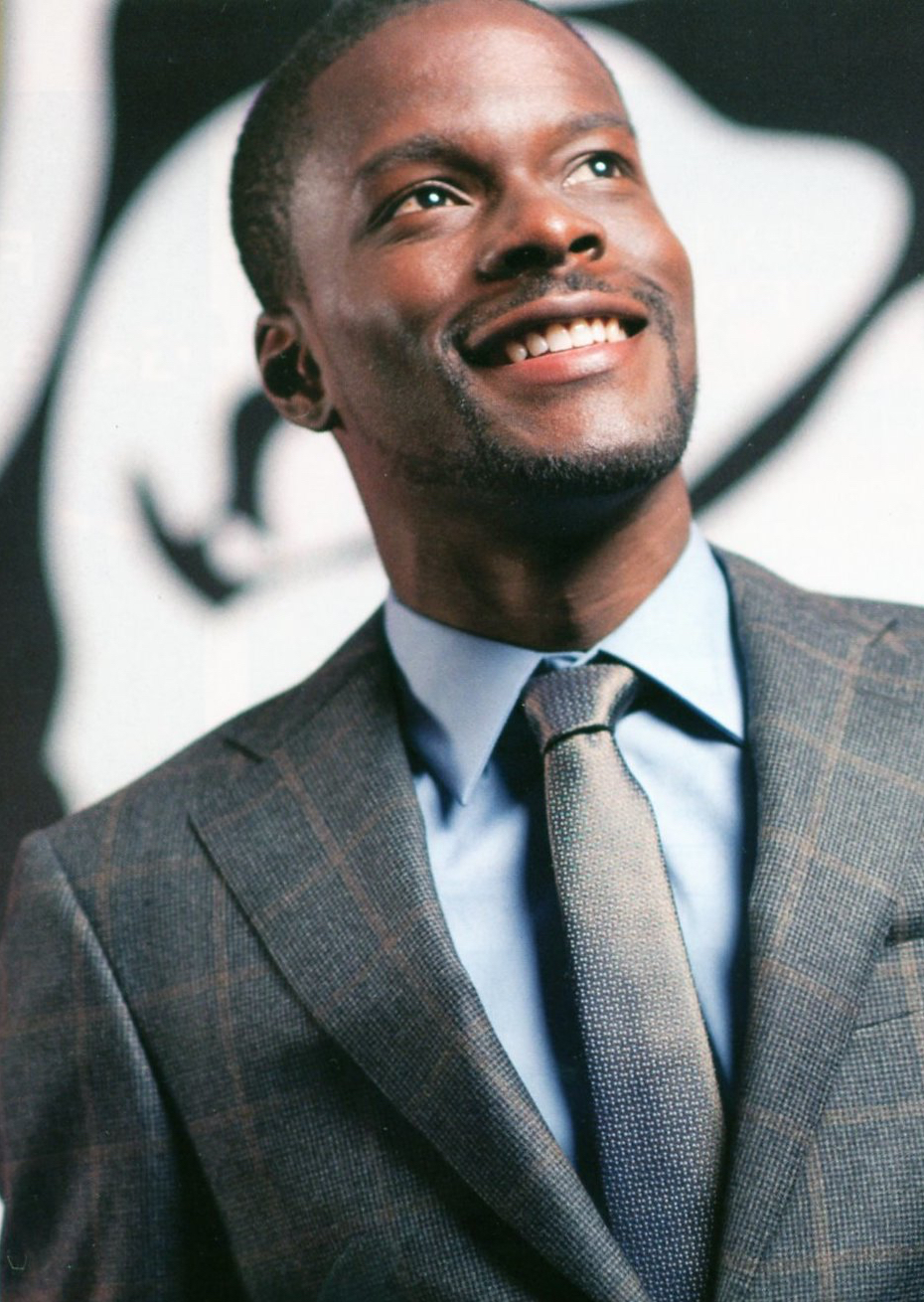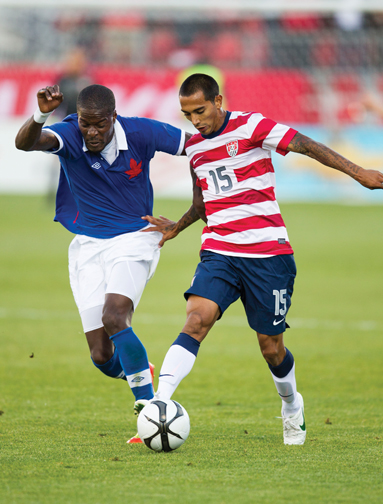
Tosaint Ricketts made the 8,000-kilometre journey from Mill Woods to Transylvania – and while it wasn’t to hunt vampires, it mightbe fair to call his former employers bloodsuckers of a different sort.
Earlier in 2012, he was in Romania doing what he loves – playing soccer – when his team, Politehnica Timisoara, stopped signing his cheques halfway through the season. But when the money stopped flowing, he couldn’t simply go home. Instead, he carried on playing for five months, while fighting to get paid or, at least, released from his three-year contract set to expire in 2013.
“They started to get behind in payments,” he recalls. “But I kept playing as hard as I could, and they couldn’t catch up with what they owed. It was like watching them slowly falling apart.”
The 25-year-old, who split his high-school years between J. Percy Page in Mill Woods and St. Francis Xavier in the west end, isn’t a household name here, despite being a regular for the Canadian men’s national team. But in Romania, where he arrived in the fall of 2010, soccer is king. It’s also a place where sports teams are extensions of the big egos who run them. Ricketts says that the most quoted figures are the team presidents, not the players or coaches, and they are unafraid to speak to the press about grudges they have against other presidents.
Imagine the soccer league as a poker game, where each team head raises the pot – even when they don’t have the money to cover their chips. And that’s what Ricketts was to the Timisoara president Marian Iancu – a blue chip.
Ricketts tried to prove to a higher authority, the Romanian Football Federation, that the team wasn’t honouring his contract. But that wasn’t a simple task, either. The rules in Romania ostensibly protect teams from being sued by players, even if these players are waiting for paycheques.
“You have to apply to them. And, you have to wait after three months of not getting paid before you can even do that. Then, you apply on the fourth month of not being paid. It got the point where FIFA, the world governing body of soccer, told me to leave [the country] . ”

But even then he wasn’t exactly free Romania’s national soccer federation still had a legal trump card it was going to play.
In June, after playing in two World Cup qualifiers in Havana and Toronto for team Canada, Ricketts returned home, happily reunited with his mother, Pam, and three brothers. He could enjoy seeing his nephew play minor soccer and spend time savouring the tropical aromas of Jamaican dishes at Irie Foods, his family’s two restaurants in Mill Woods and Old Strathcona. He also weighed several contract offers from Europe, including some from other Romanian clubs. Yet no one stopped him on the street for an autograph. “Edmonton isn’t aware of me or what I’ve done. I think it’s important that what I have done is appreciated in Edmonton,” he says. “I want to get the story out there. I want to inspire the kids that they can live their dreams, and that someone from Edmonton made it out there.”
It’s clear that Ricketts isn’t lacking in confidence. He’s not a loud, boisterous individual, but he also doesn’t wear that insincere humility that so many athletes do in front of the cameras. There’s a large lion tattooed on Ricketts’s arm. He’s a Leo, but the tattoo means more than that – it describes how he plays. “Lions usually rule their environment, and that’s the same attitude I take to the field,” he says.
Blessed with blinding speed (he’s easily the fastest player on the Canadian men’s national team) and a physique that makes him look like a 100-metre sprinter, Ricketts is part of a growing group of Edmontonians making their livings playing soccer in fields scattered around the world. These players are lauded by huge crowds in Europe, but anonymous when they come home.
Like many of them, Ricketts got his start at Edmonton Juventus, one of the top prep programs in the country. But, unlike the many prospects that come on board before their 10th birthdays, Ricketts didn’t make a mark until he was a teen. “He was one of those guys who develops late,” says Shaun Saiko, another graduate of the Juventus program who played in England before coming home to star for FC Edmonton of the North American Soccer League. “But, with the pace he’s got, he is something else. You can’t coach that kind of speed. You’re born with that.”
After Juventus, Ricketts went to the University of Wisconsin-Green Bay on a soccer scholarship. In 2007, he was selected to the Canadian national junior team that twice played in front of crowds of more than 30,000 at Commonwealth Stadium at the U-20 World Cup. It gave him the necessary momentum to do what so many young Canadian players must in hopes of launching a pro career – go to a small European league.
A Canadian player has a hard time going to one of the world’s biggest leagues, such as England or Spain, without carving a name for himself first. So, looking to make it across the Atlantic, in 2009, Ricketts joined MyPa of the Finnish league. It’s the same path that was undertaken by Edmonton’s Randy Edwini-Bonsu, who played well for half a season in Finland and then was offered a contract by a bigger German team.
MyPa had qualified for the Europa League, a tournament which sees some of the best teams from Europe face each other, and had to play a Romanian team named Politehnica Timisoara. Ricketts scored three goals in two matches – even though MyPa lost the series – and left a real impression on the Timisoara brass. In 2010, the Romanian team signed the Edmontonian.”When I came to the team [in November of 2010] , it was undefeated,” he says.
But the team wasn’t a traditional powerhouse. Far from the big clubs in Bucharest, the city is still trying to forge an identity; its name was changed from Temesvár to Timsoara after Transylvania was ceded from Austria-Hungary after the First World War. So, the soccer club did what it could to move from the rank of an outsider to a juggernaut. It spent money on foreigners, including Ricketts, in hopes of winning the national title. But, it finished second.
Finish first in the Romanian league and you will face the world’s most valuable sporting franchises, the likes of Real Madrid and Manchester United, in the Champions League. Finish second, and you only earn a chance to play them if you pass a series of qualifiers -a huge difference.
A bank would willingly have covered Timisoara’s debts had it known the club would be 100-per-cent assured of playing the superstars later in the year, but it wouldn’t take a chance on a club that could be knocked out in qualifying.
“They took a big gamble,” says Ricketts. “If they would have finished first, they would have got an automatic Champions League berth. But, instead, they went from being a Champions League qualifier to this?” Ricketts points downward, as if he is grinding his last thought into the floor with his brown penny loafers.
Not only did the club place second, but in the fall of 2011 its debts were publicized and it was exiled from the Romanian first division, forced instead to play in the country’s second-tier league. Ricketts and teammates weren’t even allowed to play its Champions League qualifier. When the team went down, many of the imports with options on their contracts that would allow them to go chose to become free agents.
“They did the right thing, they chose to leave,” says Ricketts. “If we had stayed in the Champions League, they wouldn’t have chosen to leave.” But because the Edmontonian had just signed a contract with this team, he didn’t have that flexibility. “I couldn’t leave.”
And worse yet was the stubbornness of the team’s front office. Despite being stripped of its place in the first league, it believed it could rebuild quickly. And, when other teams offered to take Ricketts’ contract off Timisoara’s hands, they were rebuffed. “I think they didn’t think things were as bad as they really were. So they decided not to sell me, which I think was a mistake,” he says.
Unfortunately, Ricketts isn’t the only Canadian player who signed a deal and then didn’t get paid. With the flagging European economy, many pro sports teams are on thin ice. But, because so many teams at the top go into hundreds of millions of Euros worth of debt to finance a winner, soccer in Europe gets closer to a financial meltdown with each passing day.
For example, Josh Simpson, Ricketts’s teammate on the Canadian national team, was forced to go to FIFA, so his contract with a Turkish team could be annulled.
He sued for release but it took six months for FIFA to give its ruling which would allow Simpson to leave the team and move to a new team in Switzerland. So, Ricketts’s case, while rare, isn’t unprecedented.By the first week of July, Ricketts was back in Europe. Instead of choosing a guaranteed deal from another suitor, he chose to try out for a spot with Dynamo Dresden, a German team in that country’s second division.
He could have jumped at the highest-paying offer, but chose instead to weigh other factors including the stability of each team. “It’s pick your poison,” he says. “It’s a decision between less money and more security or more money [and less security] . I feel better knowing what I know now. I really learned a lesson.”
And it looked like Ricketts had chosen well. He had an impressive audition in Dresden, scoring four times in his first three pre-season games with the team. He was set to put his signature on a deal with the German club when the Romanians moved the goalposts.
The Romanian Football Federation contacted Dresden’s management and informed the German side that it would be illegal for it to sign Ricketts – because he was still actually under contract to Timsoara.
Because FIFA regulates all pro soccer contracts signed on the planet, Ricketts can’t simply play for another team and dare the Romanians to sue him. FIFA can penalize a team heavily for signing a player under contract, no matter where the deal is registered. Dresden didn’t want to spend the money needed to send a legal team to fight the Romanians in court. With his work visa running out, Ricketts returned home once again in mid-July.
Stephen Hart, coach of the national team, has pledged to keep picking Ricketts to the team, even though he isn’t playing regularly.
“To keep Tos’ in shape,” says Hart, “I will do whatever I can for him.” Ricketts rewarded Hart by scoring a goal against Trinidad and Tobago in an Aug. 15 exhibition match. And soon after that match, Ricketts saw hope.
Lars Hirschfeld, a fellow Edmontonian and goalie for the national team, recommended Ricketts to his team – Vlerenga, located in Oslo, Norway. So, Ricketts headed to Scandinavia and kept very quiet about his affairs. Not even a tweet.
On the closing of the international transfer deadline, Aug. 31, Vlerenga announced it had signed Ricketts, and that it was simply going to wait for the Romanian Football Federation to hand over the certificate. Vlerenga did what Dresden refused to do: stand up to the Romanians.
Ricketts finally had someone on his side willing to unleash wooden stakes and garlic.









